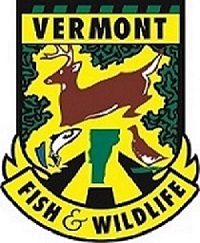
The Vermont Fish and Wildlife Department is pleased to welcome Dr. Rosalind (Roz) Renfrew as Wildlife Diversity Program Manager and David Sausville as Wildlife Management Program Manager.
Renfrew will lead the department’s work stewarding Vermont’s biodiversity, which encompasses projects from protecting rare orchids to bolstering bat populations. Her significant, varied experience in research and leadership reflects the many species and habitats under the Wildlife Diversity Program’s charge.
Renfrew earned her Ph.D. in Wildlife Ecology at the University of Wisconsin, Madison in 2002. She worked for the next five years as a conservation biologist with the Vermont Institute of Natural Science, where she directed the Vermont Breeding Bird Atlas Project. In 2007, Renfrew co-founded the Vermont Center for Ecostudies. There, in her 12 years as Senior Conservation Biologist, she developed and directed a migratory bird conservation program that included national and international research, partnership-building, conservation planning, and landowner outreach.
In 2019, Renfrew took an intentional foray beyond wildlife conservation. At the Vermont Center for Crime Victim Services (VCCVS), she broadened her leadership experience by creating internal structure, governance, policy, and processes for a complex, collaborative task force.
“The Fish and Wildlife Department’s search for a Wildlife Diversity Program Manager couldn’t have come at a better time,” says Renfrew. “I wanted to bring the skills and lessons I learned at VCCVS back into the realm of wildlife conservation.”
As a conservation biologist in Vermont, Roz has worked with many of the Fish and Wildlife Department’s biologists for decades. “I know from direct experience the unsurpassed dedication, knowledge and skills of the Wildlife Division’s staff. I am absolutely thrilled to have the honor to now work alongside them, supporting their vital efforts to conserve Vermont’s wildlife.”
Sausville will oversee the department’s work to manage Vermont’s game species, ensuring the biological health and responsible use of wildlife from ruffed grouse to white-tailed deer. He brings a wealth of species and land management experience, as well as supervisory acumen, to the position.
Sausville is a 1989 University of Vermont graduate whose research and management career has taken him across the country with a range of organizations. He has studied snow geese on the U.S. Fish and Wildlife Service’s (USFWS) Arctic National Wildlife Refuge in Alaska and researched waterfowl and land restoration with the USFWS’s Partners for Fish and Wildlife Program in South Dakota. Sausville’s time with the USFWS was followed by four years as the Forest Stewardship Biologist for Virginia Department of Wildlife Resources and an additional four years at Ducks Unlimited.
Sausville joined the Vermont Fish and Wildlife Department in 2000 as the Waterfowl Areas Biologist and became the department’s Migratory Game Bird Project Leader in 2013. Through his tenure with Fish and Wildlife, Sausville has been especially instrumental in land acquisition efforts and wetland restoration projects in the Champlain valley.
“I am looking forward to working with the Wildlife Management Program’s many experienced and dedicated biologists, and the wide range of Vermont citizens that have a passion for healthy populations of fish and wildlife and the habitats that all species need,” says Sausville. As an avid hunter, angler, and outdoor recreationists, Sausville’s commitment to wildlife management has deep roots. “My enthusiasm for this line of work was developed at a young age while participating in both consumptive and non-consumptive activities that centered on fish, wildlife, and the greater outdoors.”
“I am thrilled with two outstanding Vermonters stepping up to tackle management of Vermont’s wildlife,” says Wildlife Division Director Mark Scott. “Roz and David bring a wealth of knowledge, skills and abilities, along with proven track records and compassionate care about our state’s precious wildlife resources.”
